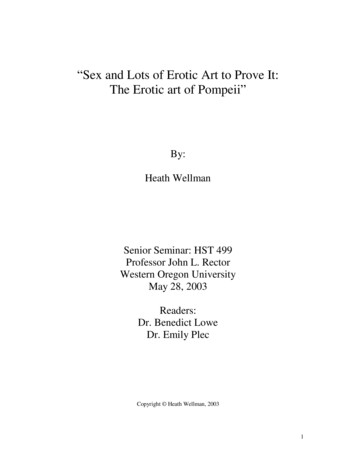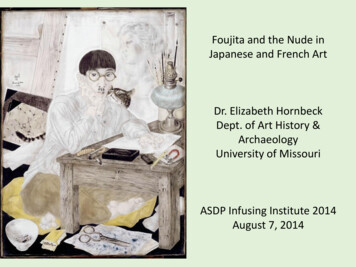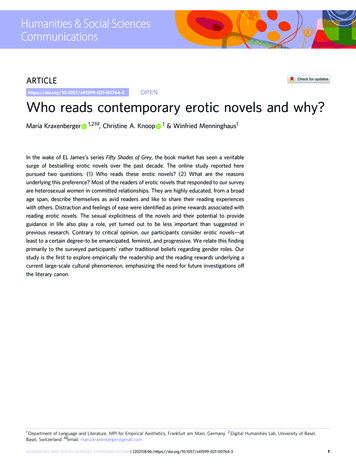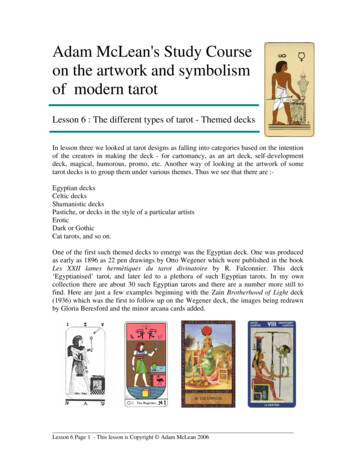
Transcription
CHAPTER 2Patronage and Erotic Rhetoricin the Sixth Century:The Case of Venantius FortunatusRobert LevineBoston UniversityMany of the papers in this volume are concerned with religious, philosophical,linguistic, and epistemological aspects of medieval erotic rhetoric; this paper isconcerned with a more practical aspect — the use of “sweet talk” for materialgain. Panegyric, often considered the lowest of literary activities, 1 is the obviousplace to look for instances of such activities, and Venantius Fortunatus’s (c. 531c.609) efforts in the genre have been surprisingly successful, since his Carminahave moved several of his most attentive modern readers to admire the sincere,authentic, passionate nature of the self-proclaimed novus Orpheus’s 2 expressionsof amicitia. An Italian, born in Treviso, trained at Ravenna, who came to France,ostensibly to pay homage to Saint Martin, but not incidentally to escape the political strife in his native land, Fortunatus is best known for composing two majorhymns, “Vexilla Regis Prodeunt” and the “Pange Lingua,” 3 but he also composedpanegyrics for Bishop Gregory of Tours, as well as for other ecclesiastical figuresand powerful aristocrats, both men and women. These poems have received less1 “Panegyricum est licentiosum, et laciniosum genus dicendi in laudibus regum, in cujus compositione homines multis mendaciis adulantur. Quod malum a Graecis exortum est, quorum levitasinstructa dicendi facultate et copia incredibili multas mendaciorum nebulas suscitavit” (Isidore ofSeville, 6.VIII.7: Panegyric is a contemptible way of speaking in praise of kings, in the course of whosecomposition men are glorified mendaciously. The Greeks developed the wretched thing, raisingmany clouds of lies with remarkable, well-trained skill).2 Venance Fortunat, Poèmes, texte établi et traduit par Marc Reydellet (Paris: Les Belles Lettres,1994), 4.3 Venance Fortunat, 5–52, 57–58.
76robert levineattention, and the judgments made about them in the last hundred and fifty yearshave been both positive and negative.For example, Judith George admires the sincerity 4 of Carmina 8.19, in whichFortunatus thanks Gregory for lending him a villa:. . . poem 8.19 is more than a mere tribute from a poet to his patron. In itsliterary echoes of the ascetics’ use of erotic terminology to express lovingfriendship, it is a tribute of great feeling to Gregory. There is respect for himas pastor and patron, but there is also personal love. 5George’s assertions imply that Fortunatus’s poems show signs of sincerity,authenticity, and accuracy (three words often invoked in the search for truth),qualities that can be dangerous, unless well disguised, for writers dependentupon patronage.In addition, Carmina 8.19, in which Fortunatus uses amor once, andaddresses Gregory merely as care, “my dear one,” it certainly seems to be thework of a cold fish when compared to the extravagant expression of passionprovided in mere prose by Paulinus in the opening of his Epistle xxiii, 8.19:Si potest mare superfluere obices suos , et quaecumque naturalem plenitudinem servant, incrementum temporale sentire, potest et caritas in tenostra cumulari . . . sollicitas potius gulam caritatis tantoque minus explesgratia litterarum, quanto majorem sedulitate ipsa et humanitate sermonistui causam suggeris, te ipsum . . . . Nam quantus quantus es, qua mente, qualingua es, totus desiderium es: et mihi dulcedinem Christi sapis ut hortusmihi, ut odor agri pleni , quem in odorem unguentorum illius currendolegisti. (PL CXI, 256–257)[If the sea can overflow its barriers, if all that is naturally full can experiencea short-lived increase, then my love for you can be enhanced . . . you awakethe gluttony of my love. Your failure to satisfy me with the pleasure of yourletters is all the greater because by the very diligence and kindness of yourwords you awake in me a greater desire for seeing you in the flesh . . . . All4 The classic work on sincerity is Henri Peyre, Literature and Sincerity. Yale Romanic Studies, 2nd Series, 9 (New Haven: Yale University Press, 1963); Lionel Trilling, Sincerity and Authenticity(Cambridge, MA: Harvard University Press, 1972), is also intermittently useful. Harry Frankfurt’srecent brief treatment of the topic is playfully provocative: Facts about ourselves are not peculiarlysolid and resistant to skeptical dissolution. Our natures are, indeed, elusively insubstantial — notoriously less stable and less inherent than the natures of other things. And insofar as this is the case,sincerity itself is bullshit. (Harry Frankfurt, On Bullshit [Princeton: Princeton University Press,2005], 66–67). See also Judith George, “Venantius Fortunatus: Panegyric in Merovingian Gaul,”ThePropaganda of Power: The Role of Panegyric in Late Antiquity, ed. Mary Whitby (Leiden: Brill, 1998),225 — 46.5 Judith W. George, Venantius Fortunatus: A Latin Poet in Merovingian Gaul (Oxford: ClarendonPress, 1992), 130.
Patronage and Erotic Rhetoric in the Sixth Century77of you, mind and tongue, I long for. Your savour is for me the sweetness ofChrist, like a garden or the smell of a plentiful field . . . . 6]Though he chooses not to match Paulinus’s hyperbole in 8.19, Fortunatus provides a more heated rhetoric elsewhere; for example, two poems to Dynamiusreflect what George calls “the tradition of the passionate expression of an asceticfriendship.” 7 Poem 6.9, to Dynamius, written in 567, while Fortunatus was stillat Metz, but after Dynamius had returned to Marseilles, contains the startlingassertion, Vulsus ab aspectu, pectore junctus ades: “torn from my sight, you arejoined to my breast,” the image of Siamese twins certainly outdoes its classicalsource or analogue, Horace’s less graphic tribute to Vergil: Et serves animae dimidium meae, “you keep one half of my soul.”However, Fortunatus uses Horace’s line in 7.20, a poem to Sigmund, an officerperhaps in the service of Sigebert, for whom he declares himself steady in love,and panting for news about his care; the poem ends with Fortunatus declaringthat Sigmund is pars animae dimidiata meae: 8Quid geris, oro, refer; tamen, ut queo longius opto,Uiuas pars animae dimidiata meae[But please tell me what you are doing; I wish that you, one half of my soul,may live as long as possible.]In 6.10.48, he addresses Dynamius with a variation of the formula, animae parsmediata meae, either unaware or heedless of the dogmatic, categorical rejectionof the possibility of amicitia between men of unequal social rank that Jeromemakes, using Horace’s very words as an example of deceit:Amicitia pares aut accipit, aut facit: ubi inaequalitas est, et alterius eminentia, alterius subjectio, ibi non tam amicitia, quam adulatio est. Unde et alibilegimus: Sit amicus eadem anima. Et Lyricus pro amico precans: Serves,inquit, animae dimidium meae (Horat.). Nolite ergo credere in amicis, idest, his hominibus, qui de amicitiis sectantur lucra. 9[Friendship assumes or makes men equal; where there is inequality, and oneman is above and the other below, there is no friendship, but adulation. Thatis why we read elsewhere, “a friend may be the same soul.” And the poet asks6 Trans. by P. G. Walsh, Letters of St. Paulinus of Nola, vol. II (Westminster, MD: Newman Press,1968), 1, 2.7 George, Venantius Fortunatus, 1992, 143.8 Horace, The Odes and Epodes, ed. and trans. C. E. Bennett (Cambridge, MA: Harvard University Press, 1968), 1.3.8 and 2.17.5.9 Jerome on Micah II, PL 25, c.1219C
78robert levinehis friend, “keep one half of my soul.” Therefore do not have faith in friends,that is, men who try to make money from friends.]In another epistle to Dynamius (VI.10), paraphrased by Judith George as, “Thetwo men are set in the literary world of lovers cruelly separated by malign andcosmic forces . . . ”, 10 Fortunatus credits his addressee’s verse with the powers ofintestinal penetration:Interiora mei penetrans possessor agelli,Felix perpetue, dulcis amice, uale.[penetrating the depths of my little field, remain forever happy, sweetfriend.]Fortunatus relentlessly relies on corporeal imagery to give the impression or illusion of intense love, a strategy that is more vivid in his poems addressed to malepatrons than to his passionate expressions of amicitia to Agnes and Radegund.The use of erotic terminology often disturbs and confuses readers; in addition,Fortunatus’s use of an ascetic strategy does not guarantee the genuineness of hisfeeling for Gregory, since no evidence of his asceticism has survived, while considerable evidence of his sensuality recurs throughout his verse and prose. Oneof the better known examples occurs in VI.vii, when the poet rhapsodizes abouteating apples:Quod petit instigans auido gula nostra baratro,excipiunt oculos aurea poma meos.Undique concurrunt uariato mala colore,Credas ut pictas me meruisse dapes.Uix digitis tetigi, fauce hausi, dente rotaui,Migrauitque alio praeda citata loco.Nam sapor ante placet, quam traxit naris odoremSic uincente gula, naris honore caret.[Since our appetites, stirring us on, hunt in the great depths, the goldenapples capture my eyes. Apples of all colours come piling in from all sides, soyou would think I had earned a painted feast. Scarcely had I touched themwith my fingers, put them in my mouth, rolled them between my teeth, andthe booty, set in motion from that spot, sped down into my belly. For the flavour delighted before it attracted the nose’s scent ; so the gullet won, whilstthe nose lost its glory.] 111011George, Venantius Fortunatus, 1992, 144.George, Venantius Fortunatus, 1992, 52.
Patronage and Erotic Rhetoric in the Sixth Century79In a poem to the nun Agnes, whom he apostrophizes as “O uenerandus amor,” heexpresses the pleasure he feels upon discovering the imprint of her fingers on thecheese she has sent to him:Aspexi digitos per lactea munera pressos,Et stat picta manus hic ubi crema rapis.Dic, rogo, quis teneros sic sculpere compulit utres,Daedalus an vobis doctor in arte fuit?O venerandus amor, cujus , faciente rapina,Subtracta specie, venit imago mihi.Spes fuit haec quoniam tenui se tegmine rupit,Nam neque sic habuit pars mihi parva dari.Haec facias, longos Domino tribuente per annos,In hac luce simul matre manente diu. (XI.xiv)[I observed the fingerprints over the milky gifts, and your hand remainedimprinted here where you pick up the butter pat. Tell me, please, whoencouraged your gentle fingers to fashion in that way? Was Daedalus yourteacher in this art? O revered love, whose image comes to me, though themould has been stolen away. But my hope was in vain, for this image brokeup in its flimsy covering. Thus not even a small part could be given to me.May you make these over the long years the Lord gives you, with our motherabiding long with you in this life.] 12Lines like these moved Richard Koebner to admire Fortunatus’s delicate understanding of the sensuality of feminine celibacy:Fortunatus stand sinnlichem Fühlen nicht fern, das beweisen seine Gedichtein ihrer Zährtlichkeit, in ihrem Verständnis für das erotische Moment derNonnenandacht und überhaupt für das Fühlen der Frau. 13More than a century ago Paul Nisard ended his book on Fortunatus with an impassioned fifteen-page defense of the sincerity and purity of Fortunatus’s amicitianot with Gregory, or with Dynamius, but with the nuns Agnes and Radegund;about poems XI.9,10, Nisard categorically asserts:12 Venantius Fortunatus: Personal and Political Poems, trans. Judith George. Translated Textsfor Historians, 23 (Liverpool: Liverpool University Press, 1995), 106.13 “Fortunatus was no stranger to sensual feelings, as his poems demonstrate, in their tenderness, in their understanding of the erotic component of a nun’s devotion, and in their generalunderstanding of a woman’s feelings.” Richard Koebner, Venantius Fortunatus: seine Persönlichkeitund seine Stellung in der geistigen Kultur des Merowingerreiches (Leipzig: B. G. Teubner, 1915), 46.
80robert levineC’est une protestation pleine de dignité et de mesure; c’est l’accent de lavérité dans sa candeur intrépide et modeste, c’est l’expression de la tendresse même qui trouve l’éloquence pour se relever . . . 14On the other hand, by calling for “douce tolérance” toward Fortunatus’s“galanterie,” 15 he concedes the possibility that the poet was less than entirely sincere, and Nisard goes even further when he complains about the poet’s compulsive desire to please, “il voulait plaire et toujours plaire, mettant presque cettequalité au-dessus de celle de poète et s’y laissant aller jusqu’à la bassesse.” 16Nisard, however, like George, neglects to consider the complexity as well as theambiguity generated by a priest establishing amicitia with patronesses who werenuns, one of whom was also, not incidentally, a former queen. 17 Fortunatus himself acknowledges part of the problem, and perhaps protests too much, whenhe insists that the intense nature of his feelings for Agnes, although it involvesamor, 18 is like that which one feels conventionally for a mother and a sister, i.e.,spiritual, not physical. Again, to represent the intensity of his feeling, he invokesbreasts and the womb:Mater honore mihi, soror autem dulcis amore,quam pietate fide pectore corde colo,caelesti affectu, non crimine corporis ullo:non caro, sed hoc quod spiritus corporis amo. (XI.vi 1–4)testis adest Christus, Petro Pauloque ministris,cumque piis sociis sancta Maria uidet,te mihi non aliis oculis animoque fuisse,quam soror ex utero tu Titania fores,si uno partu mater Radegundis utrosque,uisceribus castis progenuisset, eram,et tamquam pariter nos ubera cara beataepauissent uno lacte fluente duos.heu mihi damna gemo, tenui ne forte susurroimpediant sensum noxia uerba meum;14 “Iit is a protestation full of dignity and measure, it has the accent of truth in its bold andmodest directness, it is an expression of tenderness which even finds the eloquence to enoble itself.”Charles Nisard, Le poète Fortunat (Paris: H. Champion, 1890), 189.15 Reydellet, Venance Fortunat, Poèmes, lvi–lvii, also admires Fortunatus’s expressions offriendship, asserting that they are warmer than what is found in Sidonius or Ennodius.16 Nisard, Le poète Fortunat, 139–40.17 See Jacques Fontaine, “Hagiographie et politique,” Revue d’ histoire de l’Eglise de France 62(1976): 113–40; here 115: “Radegonde ait été à la fois hors du monde et dans le monde.”18 Chaucerians will recall the profound ambiguity of amor inscribed on the Prioress’ brooch, ll.160–62 of the General Prologue to the Canterbury Tales.
Patronage and Erotic Rhetoric in the Sixth Century81sed tamen est animus simili me uiuere uoto,si uos me dulci uultis amore coli. 19[Mother to me in honour, sister sweetly loved, whom I esteem with devotion,faith, heart and soul, with heavenly affection, and not with any bodily sin; Ilove, not in the flesh, but what the spirit yearns for . . . Christ is my witness,with Peter and Paul by His side, and holy Mary looking on with her godlyhost, that you were nothing other to me in sight and spirit than if you hadbeen my sister by birth, Titania, and as if our mother Radegund had givenbirth to both of us in a single delivery from her chaste womb, as though thedear breasts of the blessed mother had nurtured the two of us with a singlestream of milk. Alas, I bewail my danger, the fear lest by a slight whispermalicious words thwart my feelings ; but yet it is my intent to live with thesame hopes, if you wish me to be cherished with sweet love.] 20To infer, then, that Fortunatus exploited erotic terminology to produce the effectit clearly had more than 1300 years later on nineteenth- and twentieth-centuryscholars such as Nisard, Koebner and George, and may or may not have had onits original recipient, does not require strenuous effort. In any event, a friendshipbetween a man as powerful as Bishop Gregory and a man far more economicallyand socially vulnerable than his significant predecessors in panegyric (Paulinus[353–431 A.D.], Ausonius [310–394?], Sidonius [430–479?], were from wealthy,aristocratic families) was as complex in the sixth century A.D. as it was betweenMaecenas and Horace in the first century B.C. 21Recent work on patronage and poetry later in the Middle Ages tries to establish a less sentimental perspective on the problem. In the process of examiningeleventh- and twelfth-century courtly behavior, C. Stephen Jaeger argues that“The language of favor relationships at court was the language of love.” 22 As described by Lynn Staley, Ricardian speech-acts in fourteenth-century England alsoresemble Merovingian behavior eight centuries earlier:. . . the language of love is social and should be understood as practicedwithin a set of conditions that, in the case of the medieval court, cannot be19 Venanti Honori Clementiani Fortunati Opera Poetica, ed. F. Leo. Monumenta Germaniae Historica, 4, 1 (Munich: Monumenta Germanicae Historica, 1881), 260–61.20 Venantius Fortunatus: Personal Poems, trans. George, 1995, 52.21 For a discussion of the necessity of understanding the complex nature of amicitia in Horace,see I. M. Le M. Du Quesnay, “Horace, Odes 4. 5,” Homage to Horace: a Bimillenary Celebration, ed. S. J.Harrison (Oxford: Clarendon Press, 1995), 128–87.22 C. Stephen Jaeger, Envy of Angels: Cathedral Schools and Social Ideals in Medieval Europe,950–1200. The Middle Ages Series (Philadelphia: University of Pennsylvania Press, 1994), 104.
82robert levineunderstood without reference to power and to the terms of social harmonythat power produces. 23Expressions of affection, then, between two unequals, as Jerome insisted, standvirtually no chance of being reliable testimony to authentic feeling.Some recent work on Horace’s relationship to Maecenas has attempted tofree him from the demands of sincerity. According to D. P. Fowler,”any concernfor ‘sincerity’ or even ‘authenticity’ is a blind alley.” 24 According to Gregson Davis,the only authenticity that can be claimed for Horace is as “an authentic composerof lyric song.” 25 In his vigorous search for patronage, Fortunatus, whom Georgecalls “ a poet of Horatian pedigree,” 26 demonstrates a blatant, compulsive desireto please (“il voulait plaire et toujours plaire, mettant presque cette qualité audessus de celle de poète et s’y laissant aller jusqu’à la bassesse”), 27 making himselfa far more vivid example than Horace of what Vasily Rudich, in his study of Lucan,calls, “the rhetoricized mentality”: 28. . . by definition, the rhetoricized mentality is indifferent to truth and falsityand resists any attempt at consistency. . . . The forms it takes differ in different contexts, but it always helps to privilege manner over matter, ideas overfacts, and fiction over truth. 29The most dramatic, if not notorious example of Fortunatus’s indifference to truthoccurs in Carmina 6.5, a lament for the death of Galswinth, who, according toGregory of Tours, had been murdered by her husband Chilperic, enraged at herrefusal to accept Fredegund’s rival presence (576 A.D.). As Kurt Steinman haspointed out:23 Lynn Staley, Languages of Power in the Age of Richard II (University Park: Pennsylvania StateUniversity Press, 2005), 57.24 D. P. Fowler, “Horace and the Aesthetics of Politics,” Homage to Horace, 248–66; here 249. Butthe most complex discussion of patronage and poetry in Horace occurs in Phebe Bowditch, Horaceand the Gift Economy of Patronage (Berkeley: University of California Press, 2001), particularly in thechapter “From Patron to Friend,” 161–210.25 Gregson Davis, Polyhymnia: The Rhetoric of Horatian Lyric Discourse (Berkeley: University ofCalifornia Press, 1991), 247.26 George, Venantius Fortunatus, 1992, 181.27 Nisard, Le poète Fortunat, 139–40.28 Vasily Rudich, Dissidence and Literature under Nero: The Price of Rhetoricization (London:Routledge, 1997), 156–69, et alibi. Stephen Hinds’s description (Allusion and Intertext: Dynamics ofAppropriation in Roman Lyrics [New York: Cambridge University Press, 1998], 86) of Lucan, “. . . a poetwhose voice is so immoderate that his modern critics can variously accuse him of excessive obsequiousness to Nero, excessive hostility to Caesarism, and both in the same poem . . ., ” suggests that thefirst-century poet and Fortunatus may have found themselves in similar predicaments.29 Rudich, Dissidence and Literature, 156.
Patronage and Erotic Rhetoric in the Sixth Century83dass ein anonymes Schicksal, nicht der Wille Chilperichs für die Tat verantwortlich gemacht wird, entbehrt das Gedicht im entscheidenden Punktdurch das Verschweigen des Täters der historischen Wahrheit. 30Steinman goes on to point out that Fortunatus blames only improba sors for herdeath, borrowing the phrase from Lucan IV.503, perhaps because those who liveunder tyrants find it safer to blame impersonal forces than individual humanbeings.In his paper on the strategies of lament and consolation in 6.5, GregsonDavis adds the complexities of genre to the problem of determining Fortunatus’sconcern with the truth, focusing upon the elaborate obfuscation of the style ofthe poem: 31The very elaborateness and profusion of the lament in contrast to the curtailed consolation are a clear index that something gross and unnatural hasoccurred” (Davis 120). “The framework of lament which Fortunatus adoptswith minor modifications is that of Classical amatory style as exemplifiedby the erotic epyllion of Latin epic and elegiac poets (Davis 125). 32The result is a strange mingling of epithalamium and funeral oration, compounded out of erotic topoi, ornamented with alliteration and annominatio, andconcluding with an intensely carnal embrace of mother and daughter that fallsjust short of the child crawling back into her mother’s womb:Cum primum algentes iungi peteretur ad arctos,regia regali Gelesuinta toro,Fixa Cupidineis caperet ut frigora flammis,Uiueret et gelida sub regione calens,Hoc ubi uirgo metu, audituque exterrita sensit,Currit ad amplexus, Goisuinta, tuos;Tunc matris collecta sinu, male sana reclinans,Ne diuellatur, se tenet, ungue, manu.30 “. . . that an anonymous fate, not the will of Chilperic, is blamed for the deed deprives thepoem, at a decisive point, by remaining silent about the perpetrator, of historical truth.” Kurt Steinmann, Die Gelesuintha-Elegie des Venantius Fortunatus (Carmen VI 5): Text, Übersetzung, Interpretation (Zürich: Juris Druck Verlag, 1975), 182–83. Heinz Hoffman has pointed out that panegyrictends to suppress historical reality in the panegyric epic of Fortunatus’s contemporary, Corippus,as well as what Hoffman calls Fortunatus’s “hagiographisches Martinepos,” “Überlegungen zu einerTheorie der nichtchristlichen Epik der lateinischen Spätantike,” Philologus 132 (1988): 101–59; here105.31 Gregson Davis, “Ad sidera notus: Strategies of Lament and Consolation in Fortunatus’s DeGelesuintha,” Agon I (1967): 118–34.32 Davis, Polyhymnia, 120, 125; see also Sven Blomgren, “Der P. Papinii Statii apud VenantiumFortunatum vestigiis,” Eranos 48 (1950): 57–65.
84robert levineBrachia constringens nectit sine fune catenam,Et matrem amplexu per sua membra ligat.Illis uisceribus retineri filia poscens,Ex quibus ante sibi lucis origo fuit.Committens secura ejus se fasce leuari,Cujus clausa uteri pignore tuta fuit. (ll. 23–36)[When first royal Galswinth was sought in marriage for a regal bed in thechill north (when, transfixed by the fires of Cupid, she here desired the coldand lived well warmed in an icy realm), when the maiden, beside herselfwith fear and with what she heard, realised this, she fled to your embrace,Goiswinth; then, with mind disturbed, lying enfolded in her mother’sembrace, she clung with nail, with hand, so that she would not be dragged away. Bringing her arms together she wove a chain without a rope andbound her mother in her embrace with her own limbs, demanding as a daughter to be kept still by that flesh from which earlier the beginnings of herlife had been; entrusting herself in confidence to be cared for by her royalpower, in whose womb she had been safe and secure.] 33This grotesque sequence is a vivid illustration of Fortunatus’s frequent relianceon “body language” to intensify whatever emotional impact he wants to generate.Even (or unavoidably) when he composes a poem on virginity, “the flavour is decidedly erotic.” 34In addition to his steady reliance on images of “the lower bodily stratum,” 35Fortunatus relies on euphony, and specifically alliteration, to create the illusion ofintensity. The first four lines of XI.6 show some of the things that he can do withthe letter “c”,Mater honore mihi, soror autem dulcis amore,quam pietate fide pectore corde colo,caelesti affectu, non crimine corporis ullo:non caro, sed hoc quod spiritus corporis amo. (XI.vi 1–4),33 Venantius Fortunatus: Personal and Political Poems, trans. George, 41. See now M. Rouche,“Autocensure et diplomatie chez Fortunat, à propos de l’élégie sur Galeswinthe,” Venanzio Fortunato tra Italia e Francia: atti del convegno internazionale di studi: Valdobbiadene 17 maggio 1990 - Treviso 18–19 maggio 1990, ed. Tiziana Ragusa and Bruno Termite (Treviso: Provincia di Treviso, 1993),149–59; also Sven Blomgren, “Bemerkungen zur Gelesuintha-Elegie des Venantius Fortunatus,”Eranos 81 (1983): 131–38. More than a thousand years later Spenser and Milton will emphasize thegrotesque implications of the image in their representations of Error and Sin (Fairy Queen I.i.xv;Paradise Lost II, 649 ff.).34 J. M. Wallace-Hadrill, The Frankish Church. Oxford History of the Christian Church (Oxford:Clarendon Press; New York: Oxford University Press, 1983), 84. Venantius Honorius ClementianusFortunatus, Poésies mêlées ed. and trans. Charles Nisard and Eugène Rittier (Paris: Firmin-Didot,1887), Dissertation Préliminaire, 28.35 A phrase popularized by Mikhail Bakhtin, in Rabelais and his World (Cambridge: M. I. T.Press, 1968), passim.
Patronage and Erotic Rhetoric in the Sixth Century85although they of course fall far short of the encomium of Charles the Bald composed more than 300 years later by the musical Hucbald; the entire poem, everyword of which begins with “ c,” exceeds 130 lines. 36Even in prose Fortunatus cannot restrain his penchant for alliteration: “dumcaptivi solvere lora cupio, me catena constringo.” 37 But his works in verse far outnumber those in prose; in the very first poem in the latest edition, Fortunatuslimits himself to the pleasures of assonance in the first line, provides alliteratingg’s in the second line, and then bursts out with four v’s in the third line:Antistes domini, meritis in saecula uiuens,Gaudia qui Christi de grege pastor habes,Cum te Uitalem uoluit uocitare uetustas . . . (I.i)[Bishop of the Lord, living through the ages because of your worthy deeds,who possesses joys as a shepherd of the flock of Christ, since your parentswanted to name you Vital . . . .]In Carmina IV.xxii, an epitaph for two brothers buried alongside their mother, hedoes not match the bathos of Ennius’ O Tite, tute, Tati, tibi tanta, tyranne, tulisti,butNon flenda infantia fratrumSimili sunt sorte sepulti[baby brothers not to be wept for, buried by the same fate]shows great aptitude in the art of sinking. 38But his greatest self-indulgence occurs in Carmina X.ix, a poem on Childebert, in which Fortunatus compounds alliteration with polyptoton and assonancethrough the first ten lines of a fourteen-line poem, using his prosodic ornamentsthe way desperate amateur fiddlers use vibrato:Rex, regionis apex, et supra regna regimen,Qui caput es capitum, vir capitale bonum.Ornamentorum ornatus, ornatius ornans,Qui decus, atque decens, cuncta decenter agis.Primus, et a primis, prior et primoribus ipsis,Qui potes ipse potens, quem iuvat Omnipotens.PL CXXXII, c. 1041–45.In a letter to Syagrius, PL 88, c.194a; Cf. Max Manitius’s judgment, “ . . . aber zu einer stehenden Form ist bei ihm die Alliteration geworden, die er manchmal in störender Weise verwendet . . . . ”Geschichte der lateinischen Literatur des Mittelalters (Munich: Beck, 1911), vol. I, 177.38 See L. P. Wilkinson, Golden Latin Artistry (Cambridge: Cambridge University Press, 1963),25–28, for a sketch of the kinds of difficulties that arise when one tries to assess aesthetically theuse of alliteration.3637
86robert levineDulcia delectans, dulcis, dilecta potestas,Spes bona, vel bonitas, de bonitate bonus.Digne, nec indignans, dignus, dignatio dignans,Florum flos florens, florea flore fluens.Childeberte cluens haec Fortunatus amore,Paupere de censu pauper et ipse fero.Audulfum comitem commendo supplice uoto,Me quoque; sic nobis hic domineris apex.[King, leader of the area, and reign above kingdoms, you are the head ofheads, a man who is true chief good, the ornament of ornaments, whichornaments more ornately, you who are the glory, and glorious, lead all thingsgloriously, first, (etc., ad nauseam)].The link early in this passage between power and ornament clearly is secondnature for a poet dependent on patronage.The indulgence in sonic ornament that characterizes the Carmina also runsrampant in the Life of Saint Martin, where the poet indulges his fondness for alliteration to the greatest extent, producing lines in which every word alliterates, andpolyptoton and assonance abound:Foedere fida fides formosat foeda fidelis (I.506) 39[faithful faith, strengthened by divine pact, made ugliness lovely]Having restrained himself for the first seventeen lines of the poem, Fortunatusunleashes:prudens prudenter Prudentius immolat actus. 40 (Leo 296)[wise Prudentius wisely heaped up an offering of their deeds]Athough the Carmina contain, as his most recent editor and translator asserts, 41the most personal work of Fortunatus, the Life of Saint Martin, becomes urgentlypersonal when Fortunatus introduces himself into the poem, experiencing the39 As quoted by Guido Maria Dreves, Hymnologische Studien zu Venantius Fortunatus undRabanus Maurus. Veröffentlichungen aus dem Kirchenh
Patronage and Erotic Rhetoric in the Sixth Century: The Case of Venantius Fortunatus Robert Levine Boston University Many of the papers in this volume are concerned with religious, philosophical, linguistic, and epistemological aspects of medieval erotic rhetoric; this paper is concerned with a more practical aspect — the use of "sweet talk" for material gain. Panegyric, often considered .










